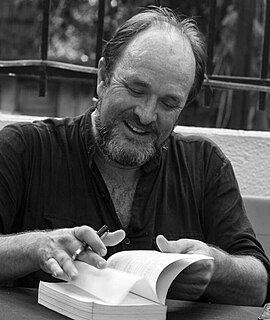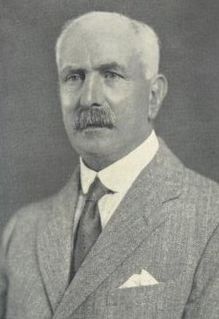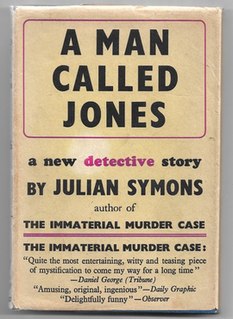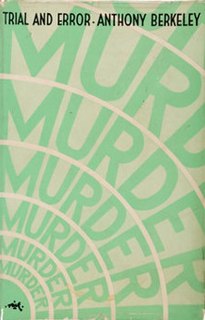
Phyllis Dorothy James, Baroness James of Holland Park,, known professionally as P. D. James, was an English novelist and life peer. Her rise to fame came with her series of detective novels featuring the police commander and poet, Adam Dalgliesh.
Michael Francis Gilbert was an English solicitor and author of crime fiction.

William Dalrymple is a Delhi-based Scottish historian and art historian, as well as a curator, photographer, broadcaster and critic. He is also one of the co-founders and co-directors of the world's largest writers festival, the annual Jaipur Literature Festival.

Hawley Harvey Crippen, usually known as Dr. Crippen, was an American homeopath, ear and eye specialist and medicine dispenser. He was hanged in Pentonville Prison in London for the murder of his wife Cora Henrietta Crippen. Crippen was one of the first criminals to be captured with the aid of wireless telegraphy.

Hardboiled fiction is a literary genre that shares some of its characters and settings with crime fiction. The genre's typical protagonist is a detective who battles the violence of organized crime that flourished during Prohibition (1920–1933) and its aftermath, while dealing with a legal system that has become as corrupt as the organized crime itself. Rendered cynical by this cycle of violence, the detectives of hardboiled fiction are often antiheroes. Notable hardboiled detectives include Dick Tracy, Philip Marlowe, Mike Hammer, Sam Spade, Lew Archer, Slam Bradley, and The Continental Op.

Peter Robinson was a British-born Canadian crime writer who was best known for his crime novels set in Yorkshire featuring Inspector Alan Banks. He also published a number of other novels and short stories, as well as some poems and two articles on writing.

Lionel Davidson FRSL was an English novelist who wrote spy thrillers.
The sensation novel, also sensation fiction, was a literary genre of fiction that achieved peak popularity in Great Britain in the 1860s and 1870s. Its literary forebears included the melodramatic novels and the Newgate novels, which focused on tales woven around criminal biographies; it also drew on the Gothic, romance, as well as mass market genres. The genre's popularity was conjoined to an expanding book market and growth of a reading public, by-products of the Industrial Revolution. Whereas romance and realism had traditionally been contradictory modes of literature, they were brought together in sensation fiction. The sensation novelists commonly wrote stories that were allegorical and abstract; the abstract nature of the stories gave the authors room to explore scenarios that wrestled with the social anxieties of the Victorian era. The loss of identity is seen in many sensation fiction stories because this was a common social anxiety; in Britain, there was an increased use in record keeping and therefore people questioned the meaning and permanence of identity. The social anxiety regarding identity is reflected in novels such as The Woman in White and Lady Audley's Secret.
An armchair detective is a fictional investigator who does not personally visit a crime scene or interview witnesses; instead, the detective either reads the story of the crime in a newspaper or has it recounted by another person. As the armchair detective never sees any of the investigation, the reader can attempt to solve the mystery on the same terms as the detective. The phrase possibly originates in a Sherlock Holmes story from 1893, The Greek Interpreter, in which Holmes says of his brother Mycroft, "If the art of the detective began and ended in reasoning from an arm-chair, my brother would be the greatest criminal agent that ever lived."

Peter (Harmer) Lovesey, also known by his pen name Peter Lear, is a British writer of historical and contemporary detective novels and short stories. His best-known series characters are Sergeant Cribb, a Victorian-era police detective based in London, and Peter Diamond, a modern-day police detective in Bath.

Detective Chief Inspector Walter Dew was a British Metropolitan Police officer who was involved in the hunt for both Jack the Ripper and Dr Crippen.

Stay with Me Till Morning is a 1970 novel by the British writer John Braine.

The Blackheath Poisonings is a British period crime television series which originally aired on ITV in 3 episodes between 7 and 9 December 1992. It is an adaptation of the 1978 novel of the same title by Julian Symons.

A Man Called Jones is a 1947 mystery detective novel by British writer Julian Symons. It is the second novel in his trilogy featuring the Scotland Yard detective Chief Inspector Bland. Symons was critical of the "Great Detective" that features in so many novels during the Golden Age of Detective Fiction and demonstrates this in the climatic scene where Bland assembles all the suspects to explain his theory, only to first send them to sleep and then be confronted by the late arrival of a previously unknown character on which the whole puzzle hinges.
We, the Accused is a British period crime television series which originally aired on BBC 2 in 5 episodes between 10 September and 8 October 1980. It is an adaptation of the 1935 novel of the same title by Ernest Raymond, itself inspired by the Doctor Crippen case.

The Massingham Affair is a 1962 crime detective novel by the British writer Edward Grierson. Grierson based on the story on a real-life case that took place in Edlingham. in the late nineteenth century.
The Massingham Affair is a British period crime television series which originally aired on BBC 2 in six episodes from 12 September to 17 October 1964. It is an adaptation of the 1962 novel of the same title by Edward Grierson. Unlike many BBC series of this era, it is believed all six episodes survive intact, but remain unreleased since their original broadcast.

Trial and Error is a 1937 mystery detective novel by the British writer Anthony Berkeley. It was a loose sequel to the 1929 novel The Piccadilly Murder, featuring two of the characters from the earlier work the unprepossessing but shrewd Ambrose Chitterwick and Chief Inspector Moresby of Scotland Yard. Berkeley was a prominent author of the Golden Age of Detective Fiction, known for his inverted detective stories.

The Secret Kingdom is a 1938 novel by the British writer Walter Greenwood. Like his best-known novel Love on the Dole it is set in Salford. It portrays the working-class socialist Byron family, and particularly the eldest daughter Paula who tries to establish an independent identity after finding working a parlour maid. She encounters Bert Treville in nearby Manchester and the two begin a courtship. After his death due to heavy drinking, she brings up her son Lance as a single-mother, throwing her effort into her talented child she is vindicated when he emerges as a talented concert pianist - performing on national radio in the final scene.














